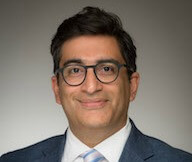
Through a recently signed Memorandum of Understanding (MOU), data scientists at the University of Notre Dame are collaborating with researchers at Chile’s Data Observatory to pioneer a new approach to analyzing Earth and space—one that puts observation data directly into the hands of people who can use it to promote sustainability, prevent natural disasters, and prepare for the effects of climate change.

Nitesh Chawla, founding director of the Lucy Family Institute for Data & Society, and Frank M. Freimann Professor of Computer Science and Engineering, recently traveled to Chile at the invitation of the Data Observatory’s top leadership, interim executive director Rodrigo Roa, and executive director Paula Diaz. An advanced open data platform, the Data Observatory is home to one of the world’s largest data collection centers, storing observations from almost 70% of the world’s telescopes. It was launched in 2019 as an alliance between Amazon Web Services, Adolfo Ibáñez University, and the Chilean government to create an open-access platform of astronomical and ecological data for the scientific community, private industry, and the public.
“In Chile, information silos have historically prevented partnerships between public and private sectors, creating challenges for researchers,” said Diaz. “The Data Observatory is a novel concept in that it opens the doorway for researchers to access a variety of datasets to understand complex societal issues.”
Chawla’s trip to Chile included an on-camera interview with Paloma Ávila of CNN Chile’s Futuro 360 and a keynote address to an international audience of data scientists at the Data Observatory’s First Congress.
During the keynote presentation, Chawla highlighted Notre Dame’s commitment to investing in data and computational science to address some of humanity’s most profound challenges. “The central mission of our work at the University of Notre Dame within the Lucy Family Institute is to translate domain-informed and data-driven artificial intelligence (AI) innovations to solve society’s wicked problems,” he explained. Data and AI, he emphasized, “should not be for the privilege of a few people, but should be used as a tool to transform the quality of life of people with less resources.”
The work at the Data Observatory supports research projects that align with the United Nations’ Sustainable Development Goals, and identify challenges within the areas of climate change, fishing, natural disaster prevention, and land management that have the potential to shift governmental policy.
Chawla envisions collaborations with Notre Dame will position the Data Observatory as a thought leader in data ethics and the responsible use of AI not only in Chile but also across Latin America. “By fostering this partnership, we are not only identifying the problems that can disproportionately impact limited resource communities but are also inspiring impactful data innovations that address these challenges,” he said. He continued, “Our MOU reinforces our commitment to developing future collaborations on scientific and educational data science and AI projects in Chile, and enables an academic exchange of scholars for lectures, scholars, and conferences to share their knowledge.”
“This is, “walking the talk,” of being a global force for good,” Chawla says.
The Data Observatory is publicly available online in Spanish and English. For more information on data science research with the Lucy Family Institute, please visit the website.
Contact:
Christine Grashorn, Communications Specialist
Notre Dame Research / University of Notre Dame
cgrashor@nd.edu / 574.631.4856
research.nd.edu / @UNDResearch
About the Lucy Family Institute for Data & Society
Guided by Notre Dame’s Mission, the Lucy Family Institute adventurously collaborates on advancing data-driven convergence research, translational solutions, and education to ethically address society’s wicked problems. As an innovative nexus of academia, industry, and the public, the Institute also fosters data science access to strengthen diverse and inclusive capacity building within communities. Our vision is to become the preeminent intellectual beacon, inspiring collaborative, equitable, and impactful data innovations as a global force for good.